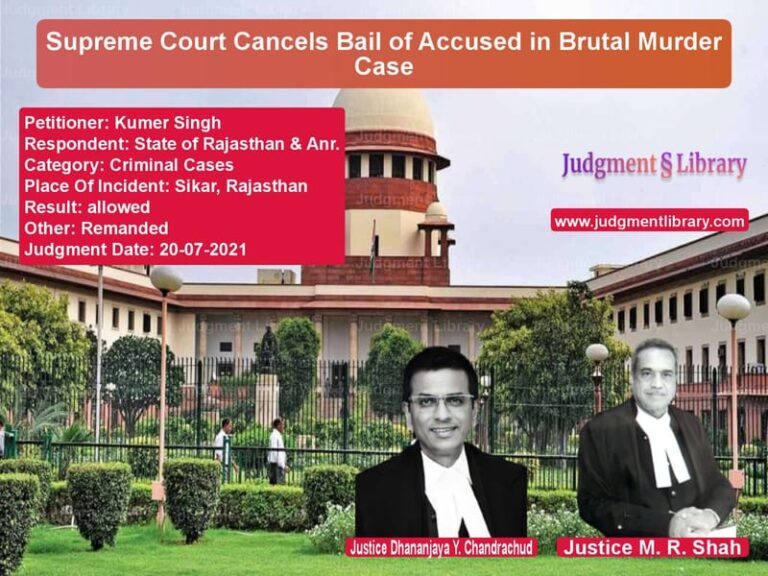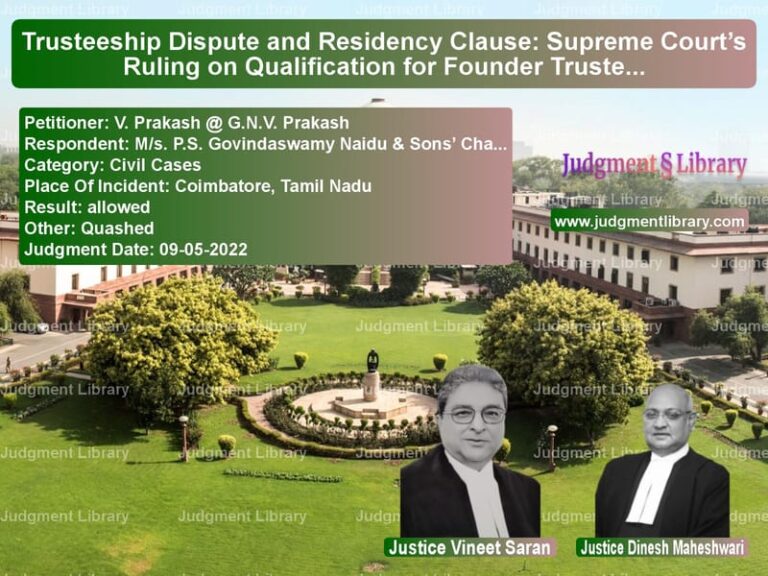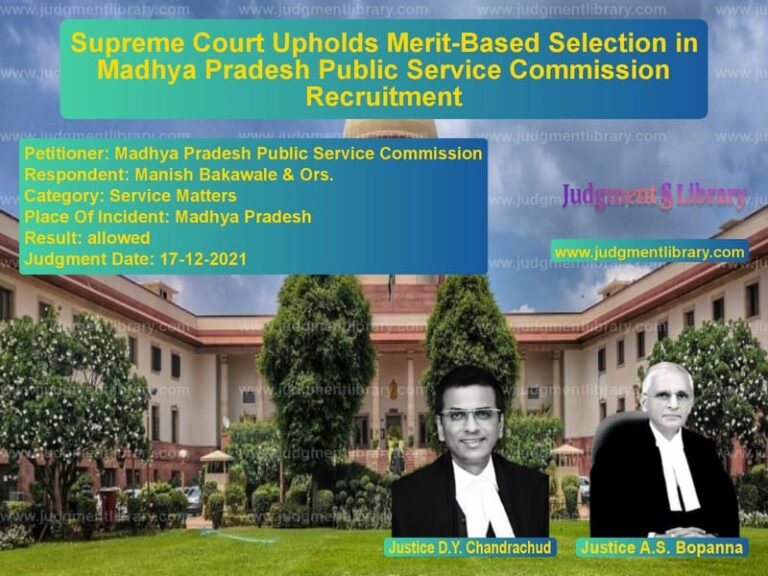Supreme Court Modifies Conviction in Agricultural Land Dispute Homicide Case
The Supreme Court recently ruled in Anbazhagan vs. The State Represented by The Inspector of Police, altering the conviction of the appellant from Section 304 Part I IPC to Section 304 Part II IPC. The case arose from a land dispute that escalated into a fatal confrontation. The Court found that the appellant had knowledge that his act could cause death but did not have the intention to cause such an injury.
Background of the Case
The appellant, Anbazhagan, and his father were accused of the murder of their neighbor Balasubramaniam following a dispute over a pathway adjacent to their agricultural fields in Sirukinathupalayam, Tamil Nadu. The incident occurred on October 25, 2015, when the appellant was harvesting tapioca and called a lorry to transport the produce. The deceased objected to the lorry passing through the disputed pathway, leading to a heated argument.
Read also: https://judgmentlibrary.com/supreme-court-acquits-man-in-murder-case-due-to-lack-of-evidence/
During the altercation, Anbazhagan allegedly picked up a weed-removing axe (Kalaikottu) and struck Balasubramaniam on the head. The deceased collapsed and was later declared dead at the hospital.
Trial Court Proceedings
- The appellant was charged under Section 302 IPC (murder), but the Trial Court convicted him under Section 304 Part I IPC (culpable homicide not amounting to murder) and sentenced him to 10 years of rigorous imprisonment with a fine of ₹10,000.
- The appellant’s father was acquitted.
The appellant challenged the conviction in the Madras High Court.
High Court’s Decision
- The High Court upheld the Trial Court’s conviction and sentence.
- The appellant then appealed to the Supreme Court, seeking to reduce the conviction from Section 304 Part I IPC to Section 304 Part II IPC.
Key Legal Issues Before the Supreme Court
- Whether the appellant had the intention to cause death or only knowledge that his actions were likely to cause death.
- Whether the case should be classified under Section 304 Part I IPC or Section 304 Part II IPC.
Arguments by the Appellant
The appellant’s counsel argued:
- The act was committed in the heat of the moment without premeditation.
- The appellant had no prior enmity with the deceased.
- The appellant did not intend to kill but acted impulsively in a fit of rage.
- The weapon used, a weed-removing axe, was an agricultural tool and not a deadly weapon.
Arguments by the Respondent (State)
The prosecution contended:
- The appellant intentionally inflicted a fatal head injury, which was sufficient in the ordinary course of nature to cause death.
- The incident fell under clause thirdly of Section 300 IPC, making it a case of murder.
- The conviction under Section 304 Part I IPC was appropriate.
Supreme Court’s Observations and Judgment
The Supreme Court, comprising Justices B.R. Gavai and J.B. Pardiwala, ruled in favor of reducing the conviction, stating:
1. Distinction Between Intention and Knowledge
“The appellant could only be attributed with the knowledge that it was likely to cause an injury which was likely to cause death, but not the intention to cause such bodily injury as was sufficient to cause death.”
2. Single Blow Theory
“Although the head injury was fatal, it was inflicted in a sudden quarrel without premeditation. The case does not fall within Clause thirdly of Section 300 IPC.”
3. Weapon Used
“The weapon was an agricultural tool, not a weapon ordinarily used for homicide.”
Final Judgment
- The Supreme Court modified the conviction from Section 304 Part I IPC to Section 304 Part II IPC.
- The sentence was reduced to 5 years of rigorous imprisonment.
Implications of the Judgment
- Reaffirms that sudden altercations leading to death must be distinguished from premeditated murder.
- Establishes that the nature of the weapon and the circumstances surrounding the act play a crucial role in determining the degree of culpability.
- Reiterates that single-blow cases should be analyzed on intent, not just the fatality of the injury.
The ruling provides clarity on the application of Sections 299 and 300 IPC, ensuring a fair assessment of intent in homicide cases.
Petitioner Name: Anbazhagan.Respondent Name: The State Represented by The Inspector of Police.Judgment By: Justice B.R. Gavai, Justice J.B. Pardiwala.Place Of Incident: Sirukinathupalayam, Tamil Nadu.Judgment Date: 19-07-2023.
Don’t miss out on the full details! Download the complete judgment in PDF format below and gain valuable insights instantly!
Download Judgment: anbazhagan-vs-the-state-represente-supreme-court-of-india-judgment-dated-19-07-2023.pdf
Directly Download Judgment: Directly download this Judgment
See all petitions in Murder Cases
See all petitions in Bail and Anticipatory Bail
See all petitions in Legal Malpractice
See all petitions in Judgment by B R Gavai
See all petitions in Judgment by J.B. Pardiwala
See all petitions in partially allowed
See all petitions in Modified
See all petitions in supreme court of India judgments July 2023
See all petitions in 2023 judgments
See all posts in Criminal Cases Category
See all allowed petitions in Criminal Cases Category
See all Dismissed petitions in Criminal Cases Category
See all partially allowed petitions in Criminal Cases Category







